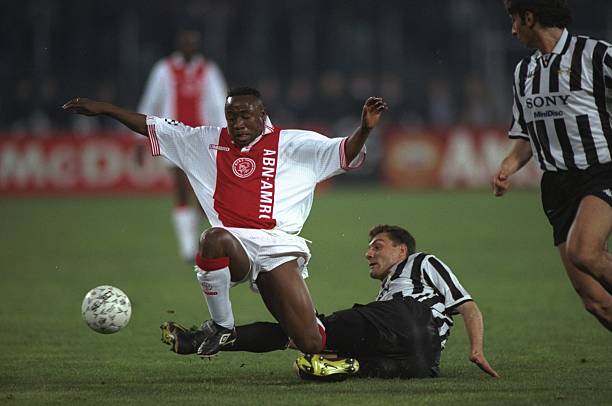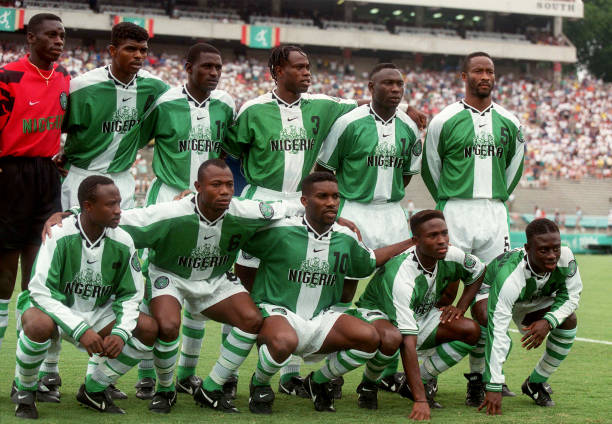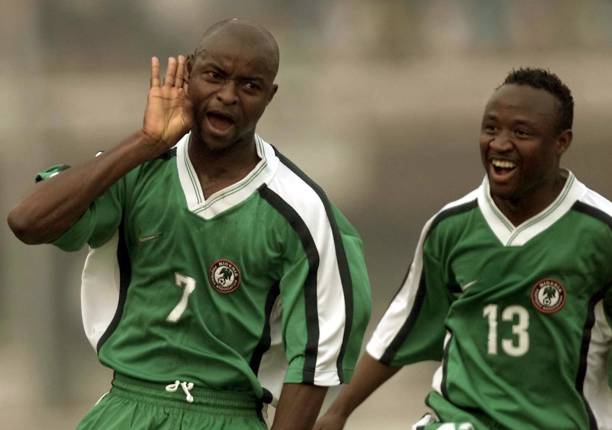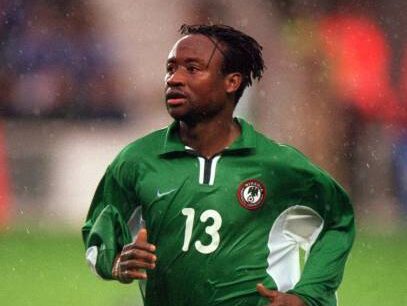By Johnson Opeisa
Across different eras and continents, every great national team, despite its many differences, shares one essential trait: consistent quality in both the number and depth of its rosters. Teams that have lit up stadiums and stirred national pride often owe their success to this very foundation. Nigeria’s Super Eagles are no different. The iconic green and white jersey has been worn by many players whose impact was felt at home and on the world stage.
Honestly and perhaps a bit soberingly, only a few Nigerian footballers maintained a world-class standard for the entirety of their careers. Yet, several had memorable stints; moments that etched their names in global football legends, even if only for a short time. Among the many notable names that fall into this bracket of excellence, Tijani Babangida, also known as TJ, stands out especially when discussed in the context of foreign reverence. In terms of national prestige, Babanginda might not be discussed in the same breath as the likes of Kanu Nwankwo or Austin ‘Jay-Jay’ Okocha, but he was undoubtedly more than a fleeting star.
At a time when African footballers were just beginning to break into European football’s consciousness, Babangida was one of the early Nigerians who made his mark in top-tier European leagues, with the Eredivisie being his primary stage. You don’t earn long-standing respect in a football-loving country like the Netherlands without making a genuine impact. Tijani Babangida did just that. Perhaps the clearest evidence of his lasting legacy came more than two decades after his retirement, when he received an outpouring of support from Dutch clubs and football legends following the tragic accident involving his family in May 2024.
Even more telling is the emergence of modern Dutch footballers—AC Milan’s Tijani Reijnders and Lazio forward Tijani Noslin — whose shared first name “Tijani” serves as a nod to Babangida’s mark in the Netherlands.
Reijnders, the eldest son in a Dutch footballing family, was named after Tijani Babangida. The 51-year-old’s peak years in the Eredivisie overlapped with those of Martin Reijnders—Tijjani’s father, and a retired professional footballer himself.
Reflecting on the origin of his name, Reijnders once explained, “There was a football player from Ajax, his name was Tijani Babangida, and my parents liked his first name.”
To fully grasp the calibre of player Tijani Babangida was and how he resonated during his active years, it helps to revisit his origins.
Tijani Babanginda: The Making of the Multinational Icon
Born in Kaduna, Tijani Babangida, like many Nigerian legends of the late nineties and early 2000s, began his professional career with a local side, Naija Tornadoes, in his case. After impressing for Nigeria’s U-23 team as one of the standout attackers at the 1991 All-Africa Games in Cairo, where the team won bronze, Babangida secured a career-defining move to the Netherlands at just 18.
Roda JC was his first stop, although it was initially a temporary fix as he was loaned out to fellow Dutch side VVV-Venlo. After a modest debut season with Venlo, who were relegated from the Eredivisie in the 1991/92 campaign, Babangida truly announced himself with 16 goals that played a pivotal role in the club’s immediate promotion back to the top flight. That performance was convincing enough for Roda JC to bring him back, and what followed was proof they made the right call.
Three solid seasons with double-digit league goals earned him a big move in 1996 to Louis van Gaal’s Ajax. He was signed as a direct replacement for compatriot Finidi George, who had just left for Real Betis in a then-record €10 million transfer after lighting up Amsterdam.
Stepping in to fill the vacuum Finidi left at Ajax was as fulfilling as it was intimidating. In many ways, the move underscored Babangida’s exceptionalism, though it also meant he had more to prove as he reflected: “When I came to Ajax after what Finidi and the team did, it was a big task for a young player. At that time, I think I worked very hard towards that success because I started with a smaller team. When you start with smaller teams in Europe, you need to be exceptional. You need to be good to convince the scouts of Ajax to figure you out.”
At Ajax, he found his stride. He evolved into a lightning-quick winger who regularly terrorised defenders and thrilled fans. His second season with the club was particularly outstanding. He played a key role in Ajax winning the Eredivisie title, finishing over 30 points clear of PSV Eindhoven. With 13 league goals in 26 games, Babangida ended the season as the club’s third-highest scorer. He also helped Ajax secure the KNVB Cup in dominant fashion, scoring the opening goal in a 5–0 final win over PSV.
His searing pace and eye for goal drew comparisons to Ian Rush, Liverpool’s all-time top scorer. “They nicknamed me Ian Rush in Holland because of my speed, skill, and desire to always go for goal,” Babangida later recalled. “My speed is natural. Sometimes I laugh when I’m running with the ball because that’s my moment — I can take on any defender in the world.”

Before eventually parting ways with Ajax and Dutch football in 2003, Tijani Babangida spent brief loan spells at Turkey’s Gençlerbirliği and later under Ronald Koeman at Vitesse. He moved on to Al-Ittihad in Saudi Arabia, where he played alongside Brazilian legend José ‘Bebeto’ Oliveira. The stint ended sooner than expected when Babangida declined a positional change to full-back, a decision made to preserve his attacking identity.
Instead, he chose to take his talents to China with Changchun Yatai in 2002, where he won the Jia B league and closed his club career on a high. His journey across five continents placed him among the few African footballers of his generation to achieve such global exposure with intent.
“I played on five continents, won the Dutch League and Cup with Ajax, scored in the European Cup, and spent most of my career in Amsterdam,’’ Babanginda reminisced in a 2019 interview. “Toward the end, I told myself it was time to explore. I had seen Europe. I wanted to experience Asia, the Gulf, and other places. I wanted to become a complete player.”
Long after traversing continents in search of completeness, Babangida’s story took a somber turn, one softened only by the dividends of his impact and contributions to the sport.
In May 2024, when the legendary Super Eagles winger lost his infant son and younger brother to a tragic car accident in Zaria, both he and his wife, Maryam Waziri, were left seriously injured and required intensive medical care. It was the Dutch football community that came to his aid, rising in unison during this dark chapter. Clubs he once graced with his talent—Ajax, VVV-Venlo, and Roda JC Kerkrade—spearheaded a fundraising campaign, rallying to raise at least €170,000 (about ₦272 million) to support the couple’s medical treatment in the Netherlands, following an initial stay at Ahmadu Bello University Teaching Hospital.
Support poured in from beyond the club walls. Former Netherlands manager Louis van Gaal was among those who publicly expressed support, while Roda JC also hosted Babangida to a get-well dinner.
Babangida’s Subtle Impact and Influence on Nigerian Football
Tijani Babangida was one of those players whose club career often outshone their time in national colours. After making his debut for Nigeria in a 1994 friendly against Romania, the Kaduna-born would go on to score five goals for the Super Eagles in 26 appearances. With Finidi George regularly preferred in his position, Babangida’s game time was often limited, but he still played a vital role during Nigeria’s golden years.
He was part of the 1996 Olympic gold-winning team in Atlanta and featured at the 1998 FIFA World Cup. He also helped Nigeria secure a silver medal at the 2000 AFCON and a bronze at the 2002 edition — the latter marking his final major appearance for the national team.

GEORGIA, UNITED STATES – July 31: Nigerian Team group of Back row, Dosu Joseph, Nwankwo Kanu, Garba Lawal, Taribo West, Uche Okechukwu, front Row, Tijani Babangida, Emmanuel Amunike, Jay-Jay Okocha, Celestine Babayaro, Mobi Oparaku the Summer Olympic Games Semi Final match between Brazil and Nigeria at Sanford Stadium Athens on July 31, 1996 in Georgia, United States. (Photo by Paul Mcfegan/Sportsphoto/Allstar via Getty Images) 
Nigeria’s Tijani Babangida (R) follows his teammate George Finidi who jubilates after scoring the first goal 03 February 2000, during the Group D African Nations Cup match against Morocco in Lagos. Nigeria won 2-0. (ELECTRONIC IMAGE) / AFP PHOTO / Olivier MORIN (Photo credit should read OLIVIER MORIN/AFP via Getty Images)
Twenty-three years later, Babangida remains active in Nigerian football, though not through the traditional route of coaching. Now 51, he serves as the President of the Professional Footballers Association of Nigeria (PFAN), an organisation dedicated to protecting and advancing the rights and welfare of professional footballers in the country. He also sits on PFAN’s Board of Trustees.
In addition, Babangida works as a football agent. He was notably involved in a deal that nearly saw Ajax sign Ahmed Musa while the Super Eagles captain was still with VVV-Venlo in 2011. Though the move didn’t materialise, Babangida continues to use his network to facilitate player transfers to European clubs. Most recently, he partnered with MOP Stars FC Academy through a Memorandum of Understanding (MoU) to oversee the development and overseas placement of young Nigerian talents.
Ultimately, footballers come and go, and every era eventually fades, as Erik ten Hag once said. But when, more than two decades after retirement, a foreign country still holds you in such high regard that fans name their children after you and rally behind you in difficult moments, it speaks to something far greater. It is a deeper kind of reverence. It may not always be loud or widely acknowledged, but Tijani Babangida has left (and continues to leave) a legacy that time can’t outrun.





